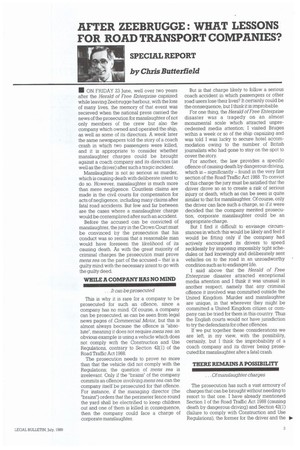AFTER ZEEBRUGGE : WHAT LESSONS FOR ROAD TRANSPORT COMPANIES?
Page 111

If you've noticed an error in this article please click here to report it so we can fix it.
SPECIAL REPORT by Chris Butterfield
• ON FRIDAY 23 June, well over two years after the Herald of Free Enterprise capsized while leaving Zeebrugge harbour, with the loss of many lives, the memory of that event was recieved when the national press carried the news of the prosecution for manslaughter of not only members of the crew but also the company which owned and operated the ship, as well as some of its directors. A week later the same newspapers told the story of a coach crash in which two passengers were killed, and it is appropriate to consider whether manslaughter charges could be brought against a coach company and its directors (as well as the driver) after such a tragic incident.
Manslaughter is not so serious as murder, which is causing death with deliberate intent to do so. However, manslaughter is much more than mere negligence. Countless claims are made in the civil courts for compensation for acts of negligence, including many claims after fatal road accidents. But few and far between are the cases where a manslaughter charge would be contemplated after such an accident.
Before the accused can be convicted of manslaughter, the jury in the Crown Court must be convinced by the prosecution that his conduct was so remiss that a reasonable man would have foreseen the likelihood of its causing death. As with the great majority of criminal charges the prosecution must prove mens rea on the part of the accused that is a guilty mind with the necessary intent to go with the guilty deed.
This is why it is rare for a company to be prosecuted for such an offence, since a company has no mind. Of course, a company can be prosecuted, as can be seen from legal news pages of Commercial Motor, but this is almost always because the offence is "absolute", meaning it does not require mens rea: an obvious example is using a vehicle which does not comply with the Construction and Use Regulations, contrary to Section 42(1) of the Road Traffic Act 1988.
The prosecution needs to prove no more than that the vehicle did not comply with the Regulations; the question of mens rea is irrelevant. Only if the 'brains" of the company commits an offence involving mens rea can the company itself be prosecuted for that offence. For instance, if the managing director (the "brains") orders that the perimeter fence round the yard shall be electrified to keep children out and one of them is killed in consequence, then the company could face a charge of corporate manslaughter. But is that charge likely to follow a serious coach accident in which passengers or other road users lose their lives? It certainly could be the consequence, but I think it is improbable.
For one thing, the Herald of Free Enterprise disaster was a tragedy on an almost monumental scale which attracted unprecedented media attention; I visited Bruges within a week or so of the ship capsizing and was told I was lucky to secure hotel accommodation owing to the number of British journalists who had gone to stay on the spot to cover the story.
For another, the law provides a specific offence of causing death by dangerous driving, which is significantly found in the very first section of the Road Traffic Act 1988. To convict of this charge the jury must be satisfied that the driver drove so as to create a risk of serious injury or death, which as can be seen is quite similar to that for manslaughter. Of course, only the driver can face such a charge, so if it were decided that the company merited prosecution, corporate manslaughter could be an appropriate charge.
But I find it difficult to envisage circumstances in which this would be likely and feel it would be fitting only if the company had actively encouraged its drivers to speed recklessly by imposing impossibly tight schedules or had knowingly and deliberately sent vehicles on to the road in an unroadworthy condition such as to endanger life.
I said above that the Herald of Free Enterprise disaster attracted exceptional media attention and I think it was unusual in another respect, namely that any criminal offence it involved was committed outside the United Kingdom. Murder and _manslaughter are unique, in that wherever they might be committed a United Kingdom citizen or company can be tried for them in this country. Thus the English courts would not have jurisdiction to try the defendants for other offences.
If we put together these considerations we are left, in my view, with the possibility, certainly, but I think the improbability of a coach company and its driver being prosecuted for manslaughter after a fatal crash.




















































































































